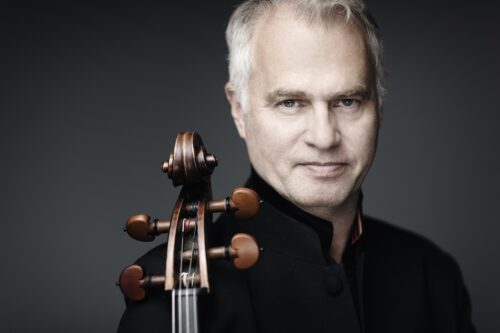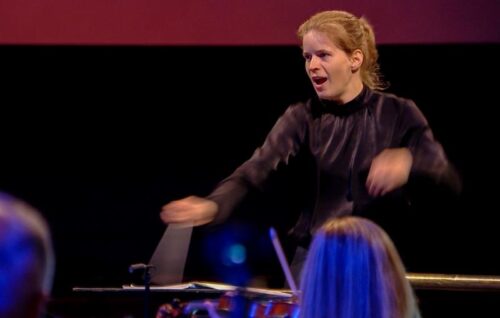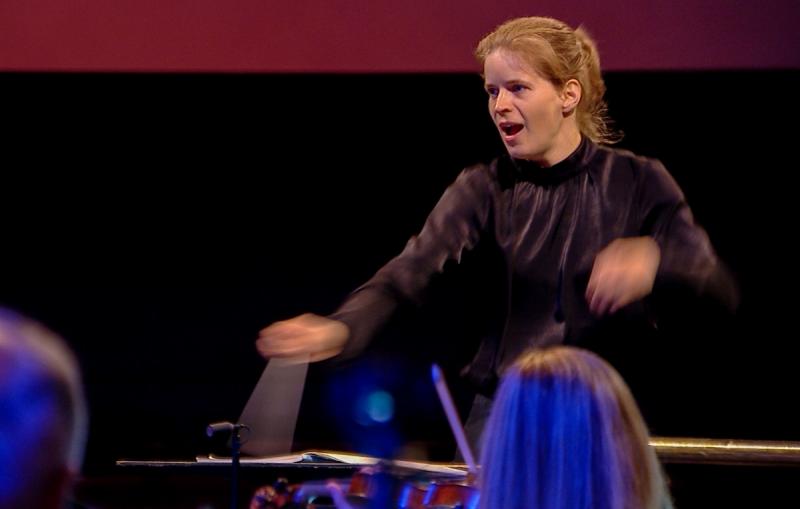 United Kingdom Dvořák, Musgrave, Sibelius: Torleif Thedéen (cello), Royal Scottish National Orchestra / Tabita Berglund (conductor). Glasgow Royal Concert Hall, 14.5.2022. (GT)
United Kingdom Dvořák, Musgrave, Sibelius: Torleif Thedéen (cello), Royal Scottish National Orchestra / Tabita Berglund (conductor). Glasgow Royal Concert Hall, 14.5.2022. (GT)

Thea Musgrave – Song of the Enchanter
Dvořák – Cello Concerto in B minor, Op.104, B.191
Sibelius – Symphony No.5 in E-flat major, Op.82
After years of inattention, now in her nineties, the eminent Scottish composer Thea Musgrave is beginning to gain more presence in concert programmes, only ten days ago, we heard another short piece as part of a matinee concert here in Glasgow. Perhaps it would not be too much if we could hear her operas staged once again in her homeland, or perhaps with this orchestra, one of her finely written concertos.
Composed in 1990, Musgrave here shares her ideas on writing the work. ‘It is based on an episode from the Kalevala, the great Finnish epic, where Väinämäinen, the hero-God, has fashioned a magical five-stringed instrument from the bones of a giant pike. Orpheus-like, he plays upon it and enchants the people. All listen and all weep, their hearts melted. Even Väinämäinen weeps and his tears “bigger than cranberries” fall into the clear waters of the deep blue sea. A sea-bird dives down to retrieve his tears – they have ripened into pearls.’
Musgrave’s Song of the Enchanter was premiered under the baton of the Glasgow-born conductor James Loughran in 1991 with the ensemble which commissioned the piece, the Helsinki Philharmonic Orchestra. It opened on fluttering strings and woodwind, almost evocative of Ravel’s impressionism with the beautiful string harmonies creating a mysterious and characterful world of sound. Duncan Swindells on the bass clarinet, Pippa Tunnell on the harp, and Adrian Wilson’s oboe invoked imagery of a deep forest glade – almost cinematic in tone – before slowly the music closed leaving one wanting to hear more from this venerated Scottish composer. This was part of the Scotch Snaps series and was supported by the John Ellermann Foundation and the Ambache Charitable Trust which raises the profile of music by women.

The young conductor Tabita Berglund made her debut here in one of the digital concerts last year and produced a very fine performance of Sibelius’s Seventh Symphony. She has quickly established a reputation among European orchestras, most significantly earning return engagements and is set surely to enjoy a major international career. That the Norwegian conductor makes a speedy return to Scotland underlines her talent and promise.
Despite Dvořák saying of the cello that ‘high up it sounds nasal, and lower down it growls’, when he was in his early twenties he attempted writing a Cello Concerto in A major, and a Cello Sonata in F major, however never pursued getting performances nor did he give opus numbers, it was only after hearing Victor Herbert’s Second Cello Concerto in New York that his interest was rekindled in the instrument. Written with a symphonic structure, the piece has been a firm favourite for its beautiful late romanticism and glorious Bohemian folk melodies. Now with the orchestra joined by the distinguished cellist Torleif Thedéen, the Allegro of Dvořák’s Cello Concerto started somewhat tentatively on the lower strings with the clarinet of Timothy Orpen and bassoons creating a sombre mood broken only by a lyrical solo passage from the horn of Andrew McLean. At last, Thedéen brought a more dramatic, forceful idiom and leading to a momentous culmination. An excitingly dramatic passage was adorned by a colourful folk theme from Orpen’s clarinet, the flute of Helen Brew, and the oboe of Wilson. The highlight of the movement however was a lovely duet between the cello and flute as the drama of the music intensified powerfully. In the second movement (Adagio) the bassoons and clarinets invoked an idyllic folk theme which was picked up enticingly by Thedéen and supported with marvellous virtuosity by the orchestra, leading to the composer’s own song ‘Leave me Alone’ in memory of his sister Josefina. In the Finale: Allegro moderato, there was a wonderfully swaying theme heard on the horns shared with the woodwind, while the strings shaped flowing melodies, and a passage decorated by great virtuosity from the oboe of Wilson before leading to thrilling forceful, dance-like exuberance before the concerto was closed peacefully by the cello on a diminuendo.
Last season, during the lockdown and as part of the Royal Scottish National Orchestra’s digital series, the Berglund gave a very fine performance when she replaced the advertised conductor at short notice. On that occasion she was outstanding, and here, in the composer’s most popular symphony, one expected much from the young conductor. Firstly, in the first movement (Tempo molto moderato) the horns fashioned a glorious upbeat theme supported by the oboe of Wilson, Orpen’s clarinet and Brew’s flute as if murmurs in the forest at the onset of spring, yet there was a moment of uncertainty when, as the argument developed, there arose a thrilling theme on the strings. The conductor’s freely flowing movements were clear and direct – not only demonstrative through her gestures and movements – but often with her eyes. The trumpets and horns were strong and powerful before a sweeping theme on the violins led by Emily Davis introduced a glorious theme shared by the brass and orchestra. In the second movement (Andante mosso) the glorious horns, and the bassoon of Luis Eisen were quietly meditative, yet the mood transformed as the flutes intoned a wonderful tune bringing a more edgy idiom, yet the oboe’s optimistic theme was reprised by the trumpets before slowly disappearing. The finale (Allegro molto) started fiercely on the strings with a catchy theme at one moment – optimistic, yet later more tragic – leading to a magnificent passage with the horns capturing in sound the beat of a bird’s wings as it rises and falls in flight – and one of the composer’s finest creations – rising to a splendid climax on the trumpets, as the composer wrote, ‘final theme – legato in the trumpets’.
This was a fine concert during a period when this ensemble has reached a new high in performance, and one looks forward to seeing this fine conductor in more diverse repertoire in seasons to come.
Gregor Tassie
